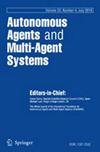La VIDA: towards a motivated goal reasoning agent
Abstract
An autonomous agent deployed to operate over extended horizons in uncertain environments will encounter situations for which it was not designed. A class of these situations involves an invalidation of agent goals and limited guidance in establishing a new set of goals to pursue. An agent will benefit from some mechanism that will allow it to pursue new goals under these circumstances such that the goals are broadly useful in its environment and take advantage of its existing skills while aligning with societal norms. We propose augmenting a goal reasoning agent, i.e., an agent that can deliberate on and self-select its goals, with a motivation system that can be used to both constrain and motivate agent behavior. A human-like motivation system coupled with a goal-self concordant selection technique allows the approach to be framed as an optimization problem in which the agent selects goals that have high utility while simultaneously in harmony with its motivations. Over the agent’s operational lifespan its motivation system adjusts incrementally to more closely reflect the reality of its goal reasoning and goal pursuit experiences. Experiments performed with an ablation testing technique comparing the average utility of goals achieved in the presence and absence of a motivation system suggest that the motivated version of the system leads to pursuing more useful goals than the baseline.


 求助内容:
求助内容: 应助结果提醒方式:
应助结果提醒方式:


